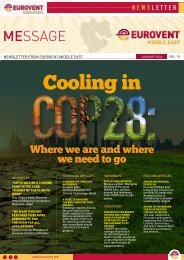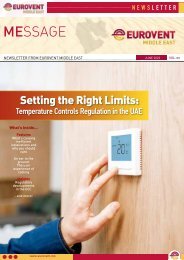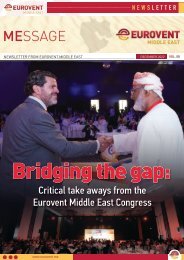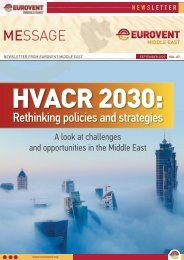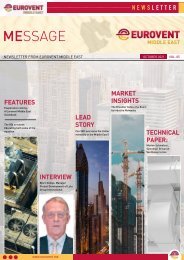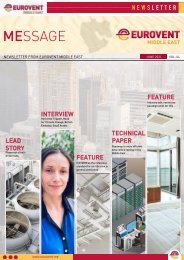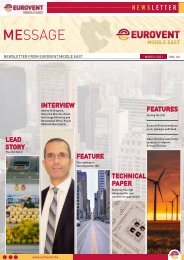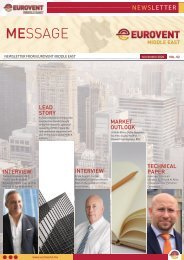EME Newsletter MEssage #1/2022
HVACR Industry news from Eurovent Middle East
HVACR Industry news from Eurovent Middle East
Create successful ePaper yourself
Turn your PDF publications into a flip-book with our unique Google optimized e-Paper software.
NEWSLETTER<br />
INTERVIEW<br />
Eurovent Middle East at five<br />
years: Creating common<br />
grounds in the chaos of<br />
competition<br />
On Eurovent Middle East’s 5th anniversary Markus Lattner, Managing Director, fleshes<br />
out the long-term impact of an industry association and reflects on the Association’s<br />
early days, the challenges of fostering a spirit of cooperation, and the need to<br />
challenge the status quo in the region for the good of the industry.<br />
5 Years, congratulations on the<br />
anniversary! What does this<br />
milestone mean to you?<br />
To me, this anniversary is an<br />
excellent moment to briefly<br />
reflect on how this journey<br />
began and to remind us of the<br />
main objective of this initiative:<br />
Bringing the industry together<br />
and providing a platform for<br />
coordination and exchange in an<br />
environment that is notoriously<br />
chaotic and driven by competition<br />
rather than cooperation.<br />
The big challenges of our time,<br />
climate change, but also the<br />
well-being of our society can only<br />
be addressed by the industry as<br />
a whole. Governments react to<br />
these challenges with increased<br />
regulations, which equally<br />
demands coordination among<br />
industry players to ensure<br />
transparent and balanced stakeholding.<br />
At just 5 years, Eurovent Middle<br />
East is still very young, especially<br />
in terms of an association. But<br />
reflecting on the past years,<br />
I am very satisfied with what<br />
has been achieved and how our<br />
organisation evolved. Considering<br />
that the pandemic has significantly<br />
impacted two out of these five<br />
years, I think we can be more<br />
than happy. Perhaps the most<br />
noteworthy takeaway is that we<br />
have proven the sustainability<br />
of the basic idea of having joint<br />
activities in the region.<br />
We must thank our members,<br />
who supported and carried out<br />
our activities over these years.<br />
These companies demonstrate<br />
true commitment toward the<br />
region and show a high level of<br />
corporate social responsibility.<br />
They understand that sustainable<br />
business depends at large on a<br />
mature market, rules, and the<br />
ability to develop sustainable<br />
guidelines for an industry that<br />
is relevant to the region and its<br />
people.<br />
Speaking about the pandemic.<br />
In which ways have the last two<br />
years impacted and influenced<br />
your work?<br />
The essence of an association<br />
lies in its ability to bring all<br />
members together and find<br />
common grounds to work on.<br />
In every aspect of what we do,<br />
you will see hours of discussion<br />
and contributions of many people.<br />
Whether it’s a workshop, a webinar<br />
or the publication of a position<br />
paper or a guidebook. It is all based<br />
on the consensus and input of our<br />
members, which, naturally, was<br />
more difficult to manage throughout<br />
the pandemic.<br />
We have had so many online<br />
meetings in the past two years,<br />
trying to cope with the situation as<br />
best as possible, and I am glad that<br />
we managed till now. But online<br />
meetings can never replace physical<br />
exchange. It is the networking, the<br />
personal spirit, which brings life to<br />
our initiatives. We all hope to see a<br />
further weakening of the virus and<br />
be allowed to resume our previous<br />
style of work.<br />
But looking back, I am also proud<br />
of what we managed to do despite<br />
the restrictions. We reacted very<br />
quickly. We knew from the beginning<br />
that COVID-19 was airborne and<br />
published guidance based on<br />
this presumption. We pushed for<br />
governments to include HVACR<br />
related companies in their list of<br />
essential businesses to ensure that<br />
even amid a crisis, our industry<br />
could deliver crucial services and<br />
products.<br />
The pandemic highlighted the<br />
importance of Indoor Air Quality,<br />
ventilation, and air filtration<br />
in a way we could have never<br />
done ourselves. It begs the<br />
question now how the public<br />
and governments cope with this<br />
experience if we see a change in<br />
the attitudes regarding our indoor<br />
environments. This will also be our<br />
responsibility, our responsibility<br />
as an industry, to provide solutions<br />
and recommendations.<br />
From the start, IAQ has been at<br />
the forefront of our agenda. That<br />
shows that the industry was well<br />
aware of its importance. Only<br />
very few in the market really<br />
understood. If we do not see a<br />
change within the building industry<br />
and from the government side to<br />
treat IAQ with the same urgency<br />
as energy efficiency, then we won’t<br />
be prepared for the next viral<br />
outbreak. And that is just a matter<br />
of time as we have now come to<br />
fully understand.<br />
Looking back, what were the<br />
biggest challenges when you<br />
started, and how have the<br />
challenges shifted over the<br />
years?<br />
The biggest challenge in the<br />
region, in the beginning, continues<br />
to be the main one now, and I am<br />
afraid, will be the case for a good<br />
time to come: the understanding<br />
of the functions of an association.<br />
Mentalities in the region are very<br />
much focused on short-term<br />
profits. Making people understand<br />
the concept, the benefits, and<br />
the investment an association<br />
requires and provides is difficult.<br />
Our impact will be visible only in<br />
the future.<br />
While the region’s workforce is<br />
driven by short term targets and<br />
is highly volatile, it is difficult to<br />
find the ones who take a longterm<br />
view and interest in seeing<br />
the region develop into a sound<br />
and sustainable market. Given this<br />
environment, it is an even greater<br />
achievement, and our members<br />
should be praised and thanked<br />
Markus Lattner<br />
for their lasting commitment to<br />
contribute toward the greater<br />
goals of the region. They are the<br />
ones carrying the ideals of cocreation<br />
and cooperation for the<br />
benefit of all.<br />
What are the benefits of an<br />
industry association? And<br />
what can you do to highlight its<br />
importance for the industry in<br />
the long term?<br />
The Middle East is not a market<br />
characterised by trust. And<br />
unsurprisingly so. If everyone is<br />
out hunting for short term profits,<br />
quality and reliability fall victim.<br />
That again leaves everyone<br />
highly distrustful of each other.<br />
Government and industry,<br />
however, need trust as a basis to<br />
develop a regulatory framework<br />
that provides fair conditions<br />
for business while ensuring<br />
government policies are followed.<br />
If authorities rely on individual<br />
companies to assess standards<br />
and technical implications,<br />
the process will remain<br />
untransparent and inefficient.<br />
An association makes for a<br />
much better stakeholder, as the<br />
positions and opinions of the<br />
industry must first be consented<br />
to before they are delivered<br />
to an authority. Secondly, an<br />
association also ensures a<br />
balance between various interests<br />
at play.<br />
Then, aside from regulatory<br />
affairs, the industry is very<br />
interested in educating market<br />
participants on its technology and<br />
products. There is a big need for<br />
constant knowledge exchange<br />
to make sure new products are<br />
understood, accepted, and used<br />
on the market. While this is, of<br />
course, the responsibility of each<br />
manufacturer, an association<br />
can provide such education in<br />
a neutral, better-organised<br />
way, and in a highly credible<br />
environment.<br />
Can you name some of the<br />
biggest issues the industry is<br />
facing in the region?<br />
This is not specific for the Middle<br />
east only, rather a general picture<br />
we face all around the globe.<br />
• Fixation on prices and<br />
ignorance of life cycle costs<br />
• Lack of qualified personnel<br />
• Proliferation of regulations<br />
- missing harmonisation and<br />
market surveillance<br />
• Lack of knowledge on<br />
standards<br />
• Lack of good practice and<br />
awareness on technical<br />
solutions<br />
• Administrative requirements<br />
without value<br />
• Copy-paste mentality among<br />
consultants carrying forward<br />
old habits and mistakes<br />
• Ignorance for IAQ and energy<br />
efficiency<br />
• Generally, a lack of<br />
cooperation and coordination<br />
among all stakeholders<br />
That gives a good picture and<br />
clarifies what we are trying to<br />
work on and achieve. No one<br />
can possibly work on these<br />
issues alone. If we want to see<br />
improvements, we better work<br />
together. Only then will we have<br />
the strength and the resources to<br />
achieve change.<br />
www.eurovent.me<br />
MAY <strong>2022</strong> VOL. 01




